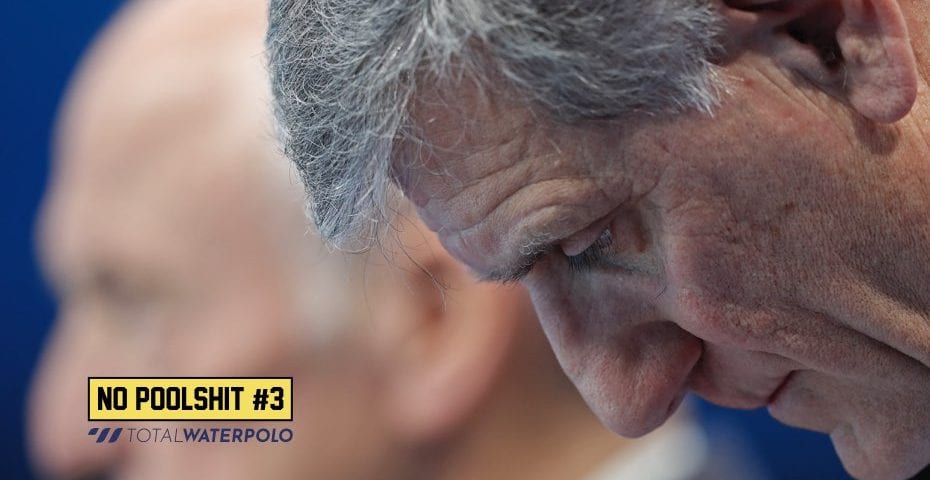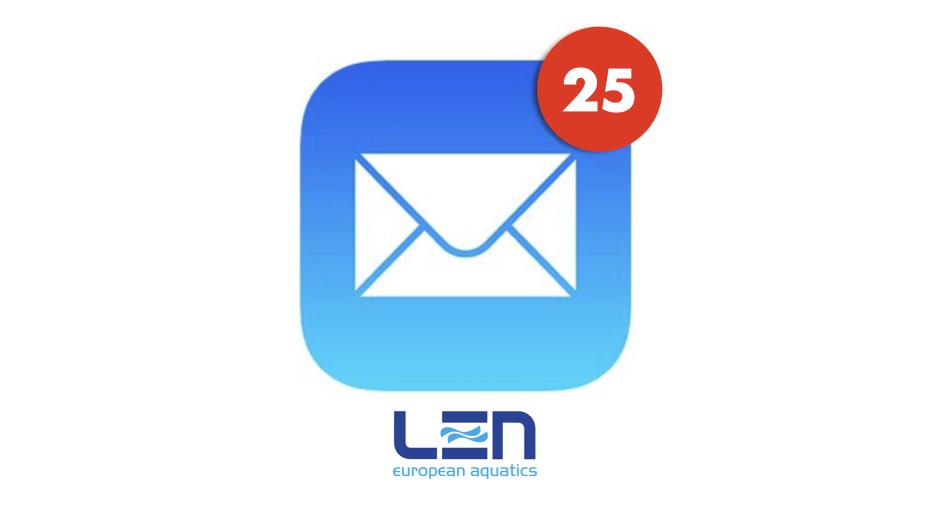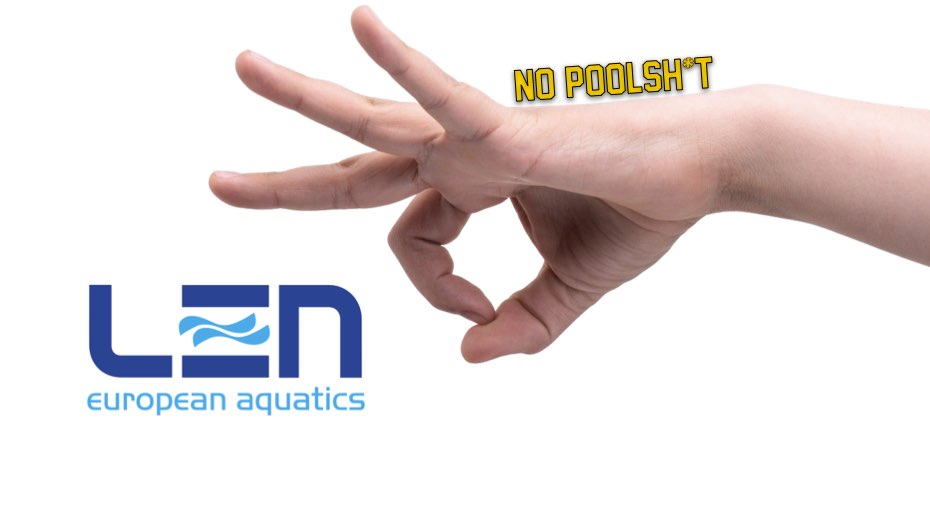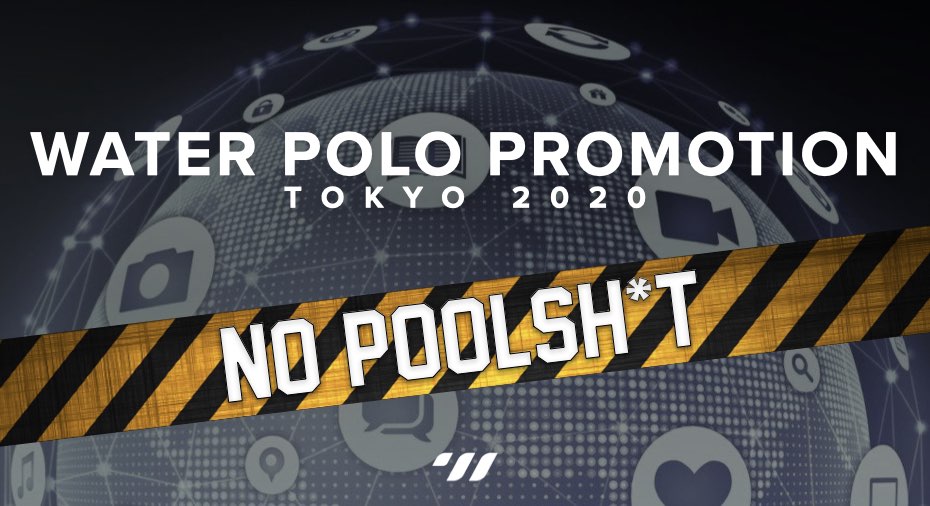Like any other sports competition in the world, the LEN Champions League is a product played for the fans who pay to consume it for various reasons. The product can be good or bad, but the demand you create for it proves its value. Good teams, and especially good players, are what helps you create that demand. Teams play for prestige, honor, but also money. If there is no money, you can’t invest in (developing or buying) good players. Without money, the quality will eventually drop, and it will be much harder to create that demand.
(Almost) any sport has its pros and cons, and we can debate whether water polo is a better or worse product than ice hockey, handball, or baseball.
But let’s put aside the fact that water polo is the oldest Olympic team sport or the fact that it’s played with a ball in a pool (or the beach) by healthy and strong athletes in little clothing. Let’s be pessimistic and say that water polo is a bad product because it is not accessible to large groups of people, not attractive when broadcast over TV, and the judges whistle so much that not even the best players are sure about the rules.
So, let’s hypothesize that LEN’s task is to create demand for a bad product. They have the best players in the best clubs. Now let’s see how much demand in terms of the value they have managed to create.
HOW MUCH DO CLUBS EARN FOR PLAYING THE LEN CHAMPIONS LEAGUE?
PRIZE MONEY
At LEN, they tend to keep things very simple: they pay out cash prizes based only on your final rankings.
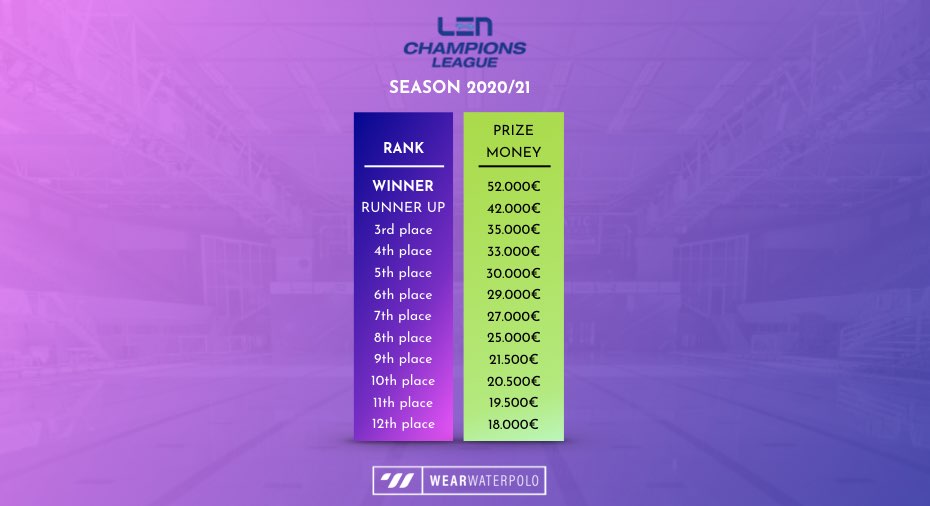
LEN Champions League prize money – season 2020/21
In total, these are 352,500€. If we look at it from a strictly economic perspective, where LEN is “the manager” and CHL is “the product” and the clubs are their “employees”, we would conclude that the Champions League is nothing more than a small Swiss business with 12 workers on a low annual wage. But wait, money is not all these “employees” receive…
SPONSORSHIP
As we reported recently, LEN and its president Barelli are hiring consultants who will help them get better partnerships and sponsor deals. So here are the perks you get if you participate in the LEN Champions League:
- 5 (FIVE) official game balls
- 10 white T-shirts for the table officials
- a borrowed “official Malmsten game court” featuring goals and pool ropes, with the option to later purchase for 6,000€ (+ Shipping + Tax = approx 9,000€) and keep or return at your own cost once you finish the competition
- the obligation to manufacture and put up LEN CHL banners and promo material for home games on your own dime
Kudos to the brilliant (yet morally questionable) Swedish sales model for their game courts, but five balls and ten t-shirts? The shipping on these items costs more than the products…
TV RIGHTS
Nothing. Zero. LEN said they are working on a model to distribute the TV rights among clubs. But still nothing. Last year, the clubs were responsible for arranging the TV production and arranging the TV rights.
This year, LEN said that they would take care of that through the European Broadcasting Union. I personally contacted the EBU twice since that decision was made to express our interest in purchasing online broadcasting rights for all LEN water polo competitions. Both times they said they have “nothing to offer” me and asked if we are maybe interested in some other sports (!? Yeah, maybe Total Waterpolo would be interested in broadcasting field hockey…). So, again, nothing.
WHAT ARE THE COSTS PER CLUB TO PLAY THE LEN CHAMPIONS LEAGUE?
In case you didn’t know, last year, the Champions League wildcard holders put up a 30,000€ participation fee, and teams that wanted to play the qualifications needed to pay 4,500€. (I really don’t get why they call it the “Champions League” when in reality, it has become a Pay-to-play league…). Our colleagues from dance.hr had published an interesting article about the difference between collected participation fees and prize money, but it remained a mystery where that money went. May I also mention that LEN didn’t return any money to clubs after they suspended last season’s edition.
This season, LEN decided to remove the participation fee after a few clubs said they couldn’t afford it but decided to add some new obligatory expenses. Here is the list of expenditures each club is financially responsible for:
- Travel arrangements
- Accommodation cost in a dedicated hotel with a preferential room rate between 100-120€ a day per person
- COVID19 RT-PCR tests
- Per diem for the appointed officials
- Contribution for TV production
Since LEN changed the competition format this year, these costs apply to a single team for 3 tournaments (for each group) that will play this season. So the Final Eight in Hannover is not included.
THE MATH
Let’s do the math. Each team has approximately 20 people. Since we still don’t know which cities will host those tournaments, let’s be very optimistic and say that the travel cost per person is 150€ for one team member. So 150€ x 20 people x 3 trips = 9,000€ for travel costs.
When it comes to accommodation, most teams will need to cover accommodation costs for 16 nights in total (they need to arrive the day before the first match). 100€ x 20 people x 16 nights = 32,000€ for accommodation for 3 tournaments.
The price of the COVID RT-PCR test varies a lot in different countries, but let’s say it is 80€ and there won’t be a reason to take additional tests.
80€ x 20 people x 3 tournaments = 4,800€ for COVID-19 tests.
Each club has to participate with 4,500€ (total for 3 tournaments) for the officials per diem. In total, that is 54,000€ for 60 games. 900€ per game for the officials (so 200-300€ per person). I really wouldn’t mind that if there weren’t players who are actually playing the competition for less money.
And let’s end up with the nonsense that water polo is probably the only sport in the world where the clubs need to pay for TV production – 13,000€ per team for 3 tournaments they will participate in, without a guarantee that your national TV station will broadcast your games. So clubs are paying for TV production and LEN is selling TV rights. Which they don’t sell, as explained earlier. Or maybe they sold it already, but where is the money in that case?
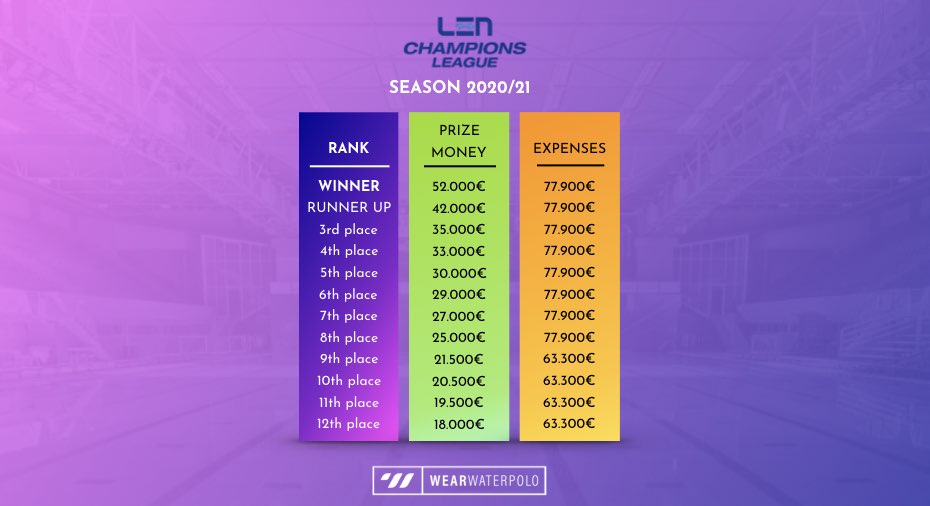
LEN Champions League expenses – season 2020/21
FINAL BALANCE
The optimistically calculated minimum cost each team will have to participate in this year’s GROUP STAGE of the Champions League is 63,300€. And this is a calculation for this season which is a bit “more affordable” than the previous one.
So if you are not strong enough to reach the Final8, your negative balance will be somewhere between -41,800€ to -45,300€.
If you have a great team, you incurred another -14,600€ for travel, accommodation, and COVID test costs. This brings you up to a total of -77,900€ you have spent playing in the LEN Champions League. If you finish in 8th place, you are the “winner” in terms of expenses, because you will have spent the most money (-52.900€) out of all the participating clubs.
Losing in the final will probably hurt you more than the fact that your club just lost 35,900€ instead of only 25,900€, but at least you end up with 5 game balls and 10 white T-shirts.
You win some, you lose some. LEN managed to change this mantra; you lose even when you win. But the reality of the situation is even worse…
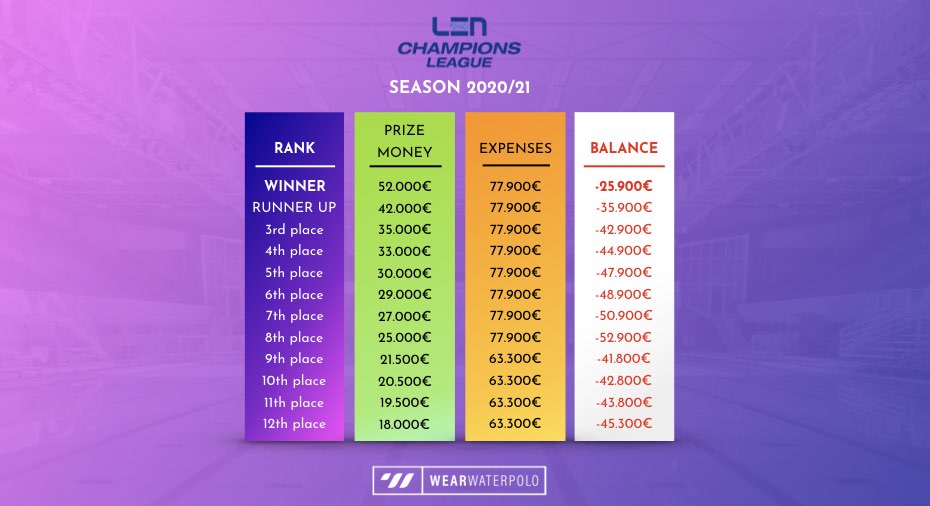
LEN Champions League club balance – season 2020/21
THE UGLY TRUTH
LEN likes to compare water polo to handball. Here are the facts: the winner of the EHF Champions League gets 1,000,000€; clubs get money for earning points; any team that plays the group stage gets 30,000€ for each away game they play. So, every club will earn at least 210,000€ for the 7 trips you have to make.
If we do the same math we did for water polo; a single club will approximately have 65.000€ of expenses. The worst handball team in the EHF Champions League doesn’t need to score a single goal and they will earn 170.900€ more than the winner of the LEN Champions League. This demonstrates the true value that “skillful” LEN managers created for the competition they are in charge of.
The current state of the strongest club competition in water polo, combined with the fact that there are participating athletes who play for just a couple hundred euros a month (unregular), makes it easy to conclude that professional water polo is dead. The question remaining: Will there be any grounds to rebuild it, once the “rats leave the sinking boat”?
THERE IS MORE VALUE
Dear club managers/directors, wake up and stop being hostages to this nonsense. Would any of you go to work every day for a salary that doesn’t cover the basic costs for coming to work every day?
Water polo isn’t as bad a product as these numbers may suggest, but it is run by people who cannot generate any value from it. Why are you supporting them? Sport isn’t what it used to be 20-30 years ago. It is much harder to get the audience’s attention, but at the same time, it has never been easier and more affordable to reach out to a huge worldwide audience. Any business (not just sport) incapable of adopting new trends and technologies is in great jeopardy of extinction. And when you are small, it is a lot easier to adapt and make this much-needed shift.
You have the resources to create much more value than this. And I’m not talking about the money only – I’m talking about the pools, human resources, tradition, connections with the local community and passion. Take advantage of the tourism potential that sport offers and create a summer competition on your beautiful open pools.
Imagine the summer games of the oldest Olympic team sport played in Recco, Dubrovnik, Alfred Hajos, Montjuic, Herceg Novi… add a pinch of trending technologies and you have the perfect ingredients for creating true value.
BONUS #POOLSHIT
For those of you who have made it this far, here is another hidden gem.
If you want to organize an “official” water polo competition, it must be played under FINA rules. If there are some circumstances and you need to modify the rules, you need to get FINA’s approval to play under modified rules to keep your competition official. For the last season’s Champions League, LEN did not make this request even though they modified the rules by not allowing quick substitutions. Hope they won’t “forget” to make their competition official this year…
Marko Štefanek
Total Waterpolo CEO and Co-founder



